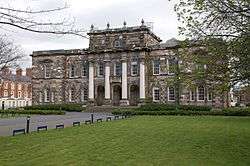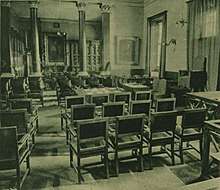Union Theological College
Union Theological College is the theological college for the Presbyterian Church in Ireland and is situated in Belfast, Northern Ireland.
 | |
| Established | 1853 (Assembly's College) |
|---|---|
| Principal | J Stafford Carson |
| Address | 108 Botanic Avenue , , Belfast BT7 1JT |
| Affiliations | Presbyterian Church in Ireland |
| Website | http://www.union.ac.uk |
 | |
The College offers a range of courses in Theology through the Presbyterian Theological Faculty Ireland (PTFI). The professors of the College constitute the PTFI which was granted a Royal Charter in 1881 to confer academic degrees. Until 2019, the College had provided teaching and assessment for undergraduate and postgraduate awards offered through the Institute of Theology of the Queen's University of Belfast.
History
_(cropped).jpg)
The Assembly's College
The College was founded in 1853 as the Assembly's College. The Renaissance Revival style building with its grand Doric porch and Baroque attic was designed by Sir Charles Lanyon, the architect of the main building at Queen's and built with Scrabo stone at a cost of £5,000.[1] Merle d'Aubigné of Geneva participated in the opening ceremony on 5 December 1853 alongside Henry Cooke, President of the Faculty (the five other professors in the new college were John Edgar, Robert Wilson, William Killen, James G. Murphy and William Gibson).
There was a large influx of students in the wake of the 1859 Revival and the south wing with its dining hall and student accommodation ('Chambers') was added in 1869.[2] Princeton seminary had an important influence in the shaping of the ethos of the College during this period: the Rev Roberts Watts who was appointed Professor of Systematic Theology in 1866 hoped to make 'Belfast another Princeton'.[3] The north wing with its wood-panelled chapel was designed by John Lanyon, son of original architect, and completed in 1881.[4] The first degrees under the Royal Charter were conferred in 1883.[5] However, the death of Watts in 1895 marked the beginning of the end of the Princetonian influence.[6] A partial union took place between the faculties in Belfast and Magee in 1922.


The newly formed Parliament of Northern Ireland met in the Assembly's College from 1921 until 1932 while Stormont was being built: the Commons met in the Gamble Library and the Senate in the College chapel. During this period the College conducted classes in a house and provided library resources in a house on University Square. In 1926 the College became a Recognised College of Queen's University.[7] During this period the College came under criticism for its embrace of theological liberalism. This culminated in a charge of heresy being brought against Professor J Ernest Davey in 1926-27. The College officially reopened in October 1932 and the inaugural lecture was delivered by the Scottish Historian Robert Rait.[8]
Between 1941 and 1948 the city police used the College as its own headquarters were bombed in the Belfast Blitz. In 1953, to mark the College's centenary year, Prof Davey was elected Moderator of the General Assembly.[9]
The Union Theological College
In 1976 theological teaching at Magee College in Derry ceased and the two colleges amalgamated in 1978. The new college, constituted by an Act of Parliament, was named The Union Theological College.[10] John M Barkley was Professor of Church History from 1954 until his retirement in 1981 (Principal 1976-1981) and was succeeded by Finlay Holmes (Principal 1987-1992). Laurence Kirkpatrick was subsequently appointed Professor of Church history in 1996 (Principal 2008-2010).
In 2003 the College celebrated its 150th anniversary by completing a £2.8million pound refurbishment in which individual study bedrooms with ensuite facilities were added. Alister E McGrath, Professor of Historical Theology at the University of Oxford gave a public lecture entitled 'Renewing our vision for the future of Protestant Christianity in Northern Ireland'. Bill Addley retired as Professor of Practical Theology in 2006 and the vacated chair was filled by Drew Gibson. Cecil McCullough, Professor of New Testament, who served as Principal from 1998-2002, retired in 2007 and was succeeded in the chair by Gordon Campbell.
On 14 November 2009 a fire caused serious damage to the rear of the college during the refurbishment of the Principal's House (a £2.2million project).[11][12] The extension known as the Training Resource Centre provided further lecture and seminar rooms was subsequently opened in September 2011.[13]
Stafford Carson was appointed as a new executive principal in 2013. At this time a major stonework restoration and conservation project took place (2013-2017).[14] Patton Taylor retired as Professor of Old Testament in 2016 (Principal 2002-2008 and 2010-2013). The Welsh Presbyterian theologian Stephen N Williams, who had held the Chair of Systematic Theology from 1994, was succeeded in 2017 by Michael McClenahan.
In 2017 the College marked the 500th anniversary of the Reformation by participating in a 'Luther 500' conference and by hosting an autumn seminar series entitled 'The Unfinished Reformation'.[15]
In 2019 Queen's University Belfast announced that it would end its relationship with the College.[16]
Faculty
The faculty comprises four Professors, the Dean of Ministerial Studies and Development, a Senior Lecturer and Lecturer in Biblical Studies, and a Lecturer in Historical Theology. The current principal of the College, J Stafford Carson, took up his position in 2013.[17]
Biblical Studies
- Prof W Gordon Campbell (Professor of New Testament)
- Dr T Desmond Alexander (Senior Lecturer in Biblical Studies)
- Dr Zachary J Cole (Lecturer in Biblical Studies)
Systematic Theology and Church History
- Prof Michael McClenahan (Professor of Systematic Theology)
- Dr Martyn C Cowan (Lecturer in Historical Theology)
Practical Theology and Ministry
- Prof Drew Gibson (Professor of Practical Theology)
- Principal J Stafford Carson (Principal and Professor of Ministry)
- Dr David Allen (Dean of Ministerial Studies and Development)
Notable Former Faculty
- Prof John Barkley (d. 1997)
- Prof Henry Cooke (d. 1868)
- Prof J Ernest Davey (d. 1960)
- Prof Finlay Holmes (d. 2008)
- Prof Robert Watts (d. 1895)
- Prof Stephen N Williams (Professor Emeritus of Systematic Theology)
Library
Founded in 1873 by Mrs Caroline Gamble in memory of her late husband, the Rev Henry Gamble, the College Library is the largest theological library in Northern Ireland. The Gamble Library stocks over 65,000 books, 20,000 pamphlets and taking over 50 journals and periodicals. The domed library served as the Chamber of the House of Commons for the Northern Ireland Parliament from 1921 to 1932. The foundation of the collection predates the College and was formed in 1845.[18] A significant collection was acquired from the estate of the Presbyterian historian Rev James Seaton Reid (d. 1851). Much of the Magee College pamphlet collection was added in 1977.
Culture & Community
Union College is the center for ministerial training in the Presbyterian Church in Ireland, and is also an important hub for the provision of theological education generally. Union College has never been far from the critical discussions and, at times, controversies so prevalent in the context of changing social, historical and cultural circumstances in the Presbyterian Church in Ireland. One of the college professors, J. Ernest Davey, was the subject of a heresy trial in 1927 because of his teaching in the College.[19] Although cleared by the Church's courts a small number of Presbyterians broke away unhappy with the decision and founded what later became the Evangelical Presbyterian Church.
References
- Allen, Robert (1954). The Presbyterian College Belfast 1853-1953. Belfast: William Mullan. p. 90.
- Allen, Robert (1954). The Presbyterian College Belfast 1853-1953. Belfast: William Mullan & Son. p. 98.
- Livingstone, David N. (1999). Ulster-American Religion: Episodes in the History of a Cultural Connection. University of Notre Dame Press. pp. 7–8, 32. ISBN 9780268043032.
- "Theology college provides union of hearts and minds". BelfastTelegraph.co.uk. ISSN 0307-1235. Retrieved 8 February 2018.
- Allen, Robert (1954). The Presbyterian College Beflast 1853-1953. Belfast: William Mullan. p. 158.
- Allen, Robert (1954). The Presbyterian College Belfast 1853-1953. Belfast: William Mullan. p. 201.
- "Queen's forges "divine" link-up with theological colleges".
- Allen, Robert (1954). The Presbyterian College Belfast 1853-1953. Belfast: William Mullan. p. 252.
- Allen, Robert (1954). The Presbyterian College Belfast 1853-1953. Belfast: William Mullan. p. 271.
- Presbyterian Church in Ireland Press Release, 2003 Presbyterian College Celebrates 150 Years Archived 19 November 2008 at the Wayback Machine. Retrieved on 8 March 2008.
- "BBC NEWS - UK - Northern Ireland - Firefighters injured at college". bbc.co.uk.
- "Theology college provides union of hearts and minds". BelfastTelegraph.co.uk. ISSN 0307-1235. Retrieved 8 February 2018.
- "Fire destroyed Union College extension finally opens".
- "How your 5p bag tax is helping to save six majestic buildings".
- "Reformation focus for Union autumn seminars".
- Meredith, Robbie (3 April 2019). "QUB to end link with theological college". Retrieved 18 May 2019.
- "Minister's pledge to help women in his new role". www.portadowntimes.co.uk. Retrieved 8 February 2018.
- Allen, R (1954). The Presbyterian College, Belfast, 1853-1953.
- "The Dictionary of Ulster Biography". www.newulsterbiography.co.uk. Retrieved 8 February 2018.
Further reading
- Presbyterian College Celebrates 150 Years, 2003 press release describing the college and its history.
External links
| Wikimedia Commons has media related to Union Theological College, Belfast. |
| Preceded by Belfast City Hall |
Home of the Parliament of Northern Ireland 1921 – 1932 |
Succeeded by Parliament Buildings (Northern Ireland) |